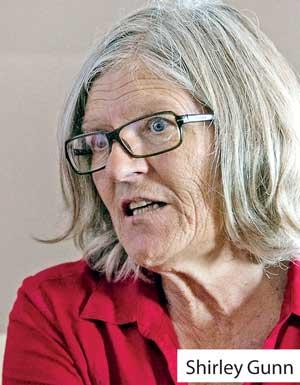24 Dec 2019 - {{hitsCtrl.values.hits}}

1971 JVP insurrection
 The Apartheid could be described as one of the most gruesome blows to human existence. Non-whites not only had to work as slaves, but were isolated from society, separated by law and were denied basic human rights. With the involvement of iconic figures such as Nelson Mandela and Archbishop Desmond Tutu, the Apartheid system was put to a halt during the early 1990s. Thereafter, the struggle was continued to ensure that justice was served to survivors. Shirley Gunn, was one of many survivors who drew inspiration from her experiences to make a change in society. She believes that personal stories of survivors could help change consciousness of a majority. Having had the absolute honour of working with Mandela, Gunn has been working in her capacity as an anti-Apartheid activist while setting up the Human Rights Media Centre to advance on human rights through the collection and dissemination of victims’ narratives.
The Apartheid could be described as one of the most gruesome blows to human existence. Non-whites not only had to work as slaves, but were isolated from society, separated by law and were denied basic human rights. With the involvement of iconic figures such as Nelson Mandela and Archbishop Desmond Tutu, the Apartheid system was put to a halt during the early 1990s. Thereafter, the struggle was continued to ensure that justice was served to survivors. Shirley Gunn, was one of many survivors who drew inspiration from her experiences to make a change in society. She believes that personal stories of survivors could help change consciousness of a majority. Having had the absolute honour of working with Mandela, Gunn has been working in her capacity as an anti-Apartheid activist while setting up the Human Rights Media Centre to advance on human rights through the collection and dissemination of victims’ narratives.
During a recent visit to Sri Lanka, the Daily Mirror caught up with Gunn herself, who shared her observations on the Sri Lankan Reparations Act, it’s limitations while also giving out some advices to the media.
Following are excerpts of an interview done with Gunn.
 QYou have been involved in the reparations journey for the past 23 years. Tell us about it.
QYou have been involved in the reparations journey for the past 23 years. Tell us about it.
If I had to go back I would say since 1996 because back then I was invited to be part of a think tank. It was considering what should constitute relevant to reparations in the South African context. My deep inquiry began through that process and I looked forward to it. The only model we had at our disposal was the Chilean model and it had its limitations, as it only looked at those who disappeared. There were two more truth commissions, but we looked at reparations from the anthropological and religious lens. But we have different Christian denominations, Muslims, Hindus and Jewish from different regions of the country. We also looked at figures; what reparations would look like in terms of monetary reparations. It was an interesting exercise and I was fortunate to have been included in it because my own inquiry was stimulated by then. In 1997 I testified to a special women’s hearing in the South African truth and reconciliation committee. It setup public hearings across the country and I was one of the 2000 survivors.
Q How did the Human Rights Media Centre come into being?
I was a member of the African National Congress and after it was disbanded, I testified before another commission in 1990. This experience gave me another angle on things. It was then that I realised how it was like to testify in public, being hounded by the media since it was televised. South Africans in their numbers heard what I said, but that wasn’t enough for the journalists. While driving home from the university where I testified, which was called Bush Campus, I kept getting calls and was being asked to speak about my experiences. It was in 1999 that I stopped and questioned what was going on. Everybody was interested in TRC and they wanted to hear it from the horse’s mouth. So again and again I made myself vulnerable until I thought I should stop it. Then I started thinking about what was ethical interviewing and how we ought to protect ourselves as survivors and in 2000 I setup the Human Rights Media Centre. I have also been part of a broad-based campaign against the South African Government and Department of Justice to speed up reparations and it’s a shame that survivors like us have to fight for our rights. This is about the long struggle.
QHave you been to Sri Lanka before?
I’m very glad because my experiences have provided me with an opportunity to help other truth commissions and help other people who have been at the mercy of negative, bad atrocities. So it gives me courage to be here in Sri Lanka, not for the first time because I was here as part of the Mandela Dialogues. Back then, I met up with Tamil survivors from Batticaloa and I was very moved and the second time I worked with 20 women over five days to create amazing life story body maps. I saw and witnessed atrocities in Sri Lanka that extended beyond the North and East.
QCould you give some examples?
Missing persons or disappeared, houses burnt with people inside with newborn to elderly, land confiscated by the Army never to be returned, so people are displaced in their country. There was a no-go zone in the east and even then there were many atrocities that took place there.
 QWhat are your observations about the Office for Reparations Act?
QWhat are your observations about the Office for Reparations Act?
In this country, according to Office for Reparations Act No. 34 of October 2018 people like us are called aggrieved which means resentful. Calling us victims isn’t great either because quite frankly, I’m a survivor because I survived detention and torture on two occasions. On the other hand, it only refers to atrocities in the North and East, but I think the whole country is affected. That for me is a serious limitation and should be reconsidered.
QWhat other limitations do you see?
Through my understanding and experience, truth plus justice plus reparations equals reconciliation. I have not seen the truth aspect, I’m not seeing the commitment to the justice aspect either and I see reparations as a floating limb somewhere away from the trunk, a branch cut off from the main stem which is the truth. I don’t see that hearings are public. Why I started with HRMC was because our stories help to change the consciousness of our country and thereafter nobody in their right mind had the chance to say ‘I didn’t know.’ If it is written, it was between the statement-maker and the individual nobody would know.
QWar and other sensitive areas are often sensationalised on media. Apart from that, war heroes are being glorified. Any advice to journalists on how they could report on these matters?
I think journalists need to understand a number of things because in my books it’s not about hearing their stories. The question I ask is whether these survivors are equipped to deal with trauma. So this is the first step of a longer journey. In my country, everyone loves Nelson Mandela (Madiba). We have bronze statues of Madiba and even schools, roads and highways named after him. Not everyone can aspire to be Mandela. He’s been put on a pedestal beyond the people, but he was working for the people. Our local heroes are important for community people. It is important that bad places are marked and the local courageous people who died for a cause are acknowledged. After all, the state will always have a one-sided stance.
QThere’s a strong influence by the Tamil diaspora to spread extremist ideologies, particularly among people in the North and East. How could this affect the reparations and reconciliation process?
You need to have cross-border hearings. You need to hear the side of the people who fled. They have to be included in it and not excluded. In Columbia they practise that. There was good reason for them to leave. It’s not a threat, but there needs to be a way of including all Sri Lankans.
Q What lessons could we learn from South Africa?
In the Sri Lankan Act, I see vocational training and educational scholarships been included for survivors, but in our context it has been miserable as it has been difficult to qualify for a scholarship. In South Africa, housing hasn’t been delivered through the TRC, health hasn’t been provided to those who were harmed and people are awaiting truth and justice. They have to launch expensive interdicts to get to the bottom of how people died in detention. Findings during the Apartheid era shows that the judiciary was on the same side as the security forces. When you don’t deal with the past adequately the next generation would only feel the unease of the past, but they would not know what we have gone through. Our children will continue to dig up the past if we fail, and we have a duty as citizens and writers to dig further.
Going beyond North and East
The Sri Lankan Constitution recognises that every Sri Lankan has the right to enjoy equal protection before the law. Hence the Office for Reparations Act recognises the dignity of victims of past conflicts and that the respect to their right to an effective remedy would speed up the reconciliation agenda in the country. But ever since the Office for a Reparations Act was drafted, there seems to be serious limitations with more emphasis being placed only on those affected by the war. But there are survivors of the 1971 JVP insurrection, Black July, Rathupaswala shooting, Salawa inferno and even the tsunami. Therefore, they too have the right to find out about their loved ones. But one of the observations is that reconciliation has thus far been a one-way process although numerous commissions and offices were setup with much fanfare. For them, justice has been a struggle ever since their loved ones departed, awaiting responses to their doubts and suspicions, which they believe would be answered one day, during their lifetime.
28 Nov 2024 4 hours ago
28 Nov 2024 4 hours ago
28 Nov 2024 5 hours ago
28 Nov 2024 7 hours ago
28 Nov 2024 8 hours ago